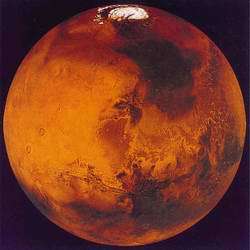Asteroid Threatens to Hit Mars

Astronomers funded by NASA are monitoring the trajectory of an asteroid named 2007 WD5 that is expected to cross the orbital path of Mars early next year. Calculations by NASA's Near-Earth Object Office at the Jet Propulsion Laboratory indicate that the 164-ft wide asteroid may pass within 30,000 miles of Mars at about 6 a.m. EST on Jan. 30, 2008.
"Right now asteroid 2007 WD5 is about half-way between the Earth and Mars and closing the distance [to Mars] at a speed of about 27,900 miles per hour," said Don Yeomans, manager of the Near Earth Object Office at JPL.
There is a 1-in-75 chance of 2007 WD5 hitting Mars; researchers can't be more confident than that because of uncertainties in the asteroid's orbit. If this unlikely event were to occur, however, the strike would happen somewhere within a broad swath across the planet north of where the Opportunity rover is.
"We estimate such impacts occur on Mars every thousand years or so," said Steve Chesley, a scientist at JPL. "If 2007 WD5 were to thump Mars on Jan. 30, we calculate it would hit at about 30,000 miles per hour and might create a crater more than half-a-mile wide." The Mars Rover Opportunity is currently exploring a crater approximately this size.
Such a collision could release about three megatons of energy. Scientists believe an event of comparable magnitude occurred here on Earth in 1908 in Tunguska, Siberia, but no crater was created. The object was disintegrated by Earth's atmosphere before it hit the ground, although the air blast devastated a large area of unpopulated forest. The Martian atmosphere is much thinner than Earth's so a similar sized impactor would be more likely to reach the ground.
Asteroid 2007 WD5 was first discovered on Nov. 20, 2007, by the NASA-funded Catalina Sky Survey and put on a "watch list" because its orbit passes near the Earth. Further observations from both the NASA-funded Spacewatch at Kitt Peak, Ariz., and the Magdalena Ridge Observatory in New Mexico gave scientists enough data to determine that the asteroid was not a danger to Earth, but could potentially impact Mars.
Because the asteroid has been tracked for little more than a month, there is still some uncertainly about the path it will take. "Over the next five weeks, we hope to gather more information from observatories so we can further refine the asteroid's trajectory," says Yeomans. More data could eliminate or confirm the possibility of an impact.
Source: NASA





















